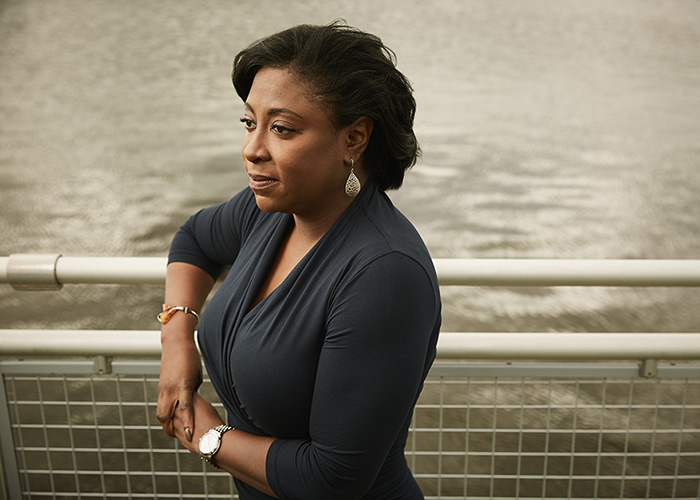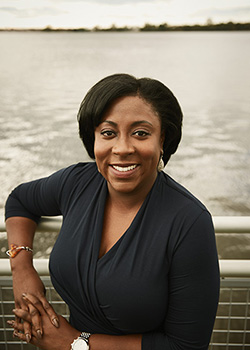Follow My Lead: Amber Racine, Esq.
As told to Maria Gardner
 Photos by Jared Castaldi
Photos by Jared Castaldi
January 24, 2019
BS History and Politics ’04
Attorney, Raynes Lawn Hehmeyer
Stumbling upon personal injury law during her co-op as a history and politics student and A.J. Drexel Scholar at Drexel, Amber Racine has since become a rising star of the field. Her accolades range from “Lawyer on the Fast Track” from The Legal Intelligencer to being named chair of the Philadelphia Bar Association Board of Governors for 2019. Her successes aside, Racine is most grateful for the chance to make a difference in people’s lives.
Growing up in Harlem, New York, my mom made it very clear to me and my brother that we had a lot of things that other people didn’t have.
Number of Vacation Days I Took Last Year:
10 Days
My Book Recommendations for Aspiring Leaders:
“The Alchemist” by Paulo Coelho and “Strategize to Win” by Carla Harris
My First Job:
Teacher Assistant, Dance Theatre of Harlem
They weren’t extravagant things — a house, food to eat, warmth. But we were lucky kids. And we had a responsibility to lead by example, to give back.
In that same house, I was also lucky enough to watch — probably too much — “Matlock” and “The Cosby Show.” At some point when I was 7 or 8, watching one of those episodes, I made the decision that someday, I would become a lawyer.
And I did. Today, I’m a plaintiff’s attorney. Unlike for a lot of little kids, my career ambitions somehow stuck, and so did the lessons from my mother.
When I choose to take a leadership position for any organization, whether it’s my full-time job or a volunteer role, I do it with the goal of serving others.
But now, I give back for more reasons than “because mom said so.”
I grew up working part-time jobs, whether paid or volunteer, since I was 12. When it came time to pick a college, I picked Drexel so that I could continue to work through the co-op program.
I landed a co-op at a law firm that represents victims of negligence. I thought I would do the co-op for six months and continue my studies, but this work changed that plan. At a personal injury firm, I realized I could help people when they needed it most.
So instead of being a full-time student who worked on the side, I became a full-time paralegal who fit in classwork on my lunch breaks and in the evenings. It took me an extra year to graduate, but I continued at that same firm after undergraduate and through law school, when I was hired there full time as an attorney.
I still represent the catastrophically injured, but now for the firm Raynes Lawn Hehmeyer.

Personal injury law is unlike any other sector of law. You’re working with people when they’re at their lowest point — usually, because of something they never saw coming. A daughter who lost her mother to a drunk driver. A woman instantly paralyzed after an accident at a resort. The family of a volunteer firefighter who fell from a helicopter to his death.
Helping these families is rewarding work, but it’s hard not to notice that there are very few women of color who do what I do. In a courtroom among 140 attorneys, I’m often one of maybe five people of color. And as a woman, I’m often the only black woman in the room.
Diverse perspectives are critical, and giving back means offering my voice to help people in more than one way.
I’m involved with the Barristers’ Association of Philadelphia, a bar association focused on the black community. We go into schools to talk to minority students, often black and Hispanic, about careers in law.
We’re there to let the students know we support them and to teach them the importance of networking.
These kids see “Law and Order” — like I once did in my “Matlock” days — and think all lawyers are criminal attorneys. But there are so many different fields of law; they can discover their own niches, just like we did.
As attorneys, we’re not rock stars. We’re not athletes, and we’re not glamorous. But I like to think that we’re giving these students another example of a way to make both a living and a positive impact.
We tell them that none of us are perfect, and your past doesn’t have to dictate your future. You can use your skills and education to start making a difference today.
Leadership means service. It isn’t selfish, and it isn’t shortsighted. It’s about thinking of long-term solutions for problems that affect people beyond yourself. If you’re going to lead people, accomplish something.
* This article originally appeared in the College of Arts and Sciences' Ask magazine feature story, “Follow my Lead.” For more Ask stories, visit askmagazine.org.